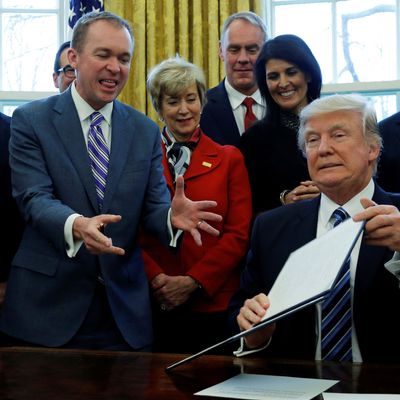
For more than a generation, the Republican Party has single-mindedly pursued the goal of maximizing economic inequality. They have been almost as single-minded about not describing this as their priority. Republicans say their goal is reducing out-of-control deficits, or reducing out-of-control surpluses, or promoting economic growth, or saving Social Security and Medicare. But Donald Trump’s budget director Mick Mulvaney, in a new interview with CNBC’s John Harwood, basically admits that what he cares about is reducing transfers from the rich to the poor:
Bad spending, to me, in terms of its economic benefit, would be wealth-transfer payments. It’s a misallocation of resources. Infrastructure is sort of that good spending in the middle, where even if you do misallocate resources a little bit, you still have something to show for it. It’s tangible, it may help economic growth, and so forth. At the other end of the spectrum, at the very other end, is letting people keep more of their money, which — while it can contribute to the deficit in a large fashion — is the most efficient way to actually allocate resources. It’s a little less important to me if infrastructure adds to the deficit. And I’m really not interested in how tax reform handles the deficit.
The place to begin understanding Mulvaney’s ideas here is where he says “letting people keep more of their money … is the most efficient way to actually allocate resources.” The premise of this statement is that the market distribution of income is sacrosanct, and progressive taxation is thus both morally wrong (because it takes money that rightly belongs to high-income people who earned it on their own) and inefficient. Mulvaney concedes that cutting taxes for high-income earners can “contribute to the deficit,” but this fact is “less important.”
On the other end of the spectrum, Mulvaney says “wealth-transfer payments” are “bad spending.” Again, this follows from his belief that redistributing resources from rich to poor offends both morality and economic efficiency. And there in the middle lies infrastructure — which, since it’s not redistributive, is not as morally or economically offensive as transfer payments. The Republicans are cross-pressured on infrastructure spending, which tends to be quite popular; their default position tends to be to spend a lot of money on it under Republican presidents, as they did under George W. Bush and would like to do again under Trump, while opposing it as reckless, unaffordable spending under Democratic presidents.
What makes Mulvaney’s comments so unusual is not only their frankness, but also their comprehensiveness. Republican politicians tend to segregate their discussion of taxes and spending, so that they can frame their opposition to transfer payments as concern about deficits, while framing their desire of regressive tax cuts as being unrelated to deficits. Mulvaney, who is known in Washington as a budget hawk’s budget hawk, is essentially conceding that deficits have nothing to do with the Republican fiscal agenda.






























